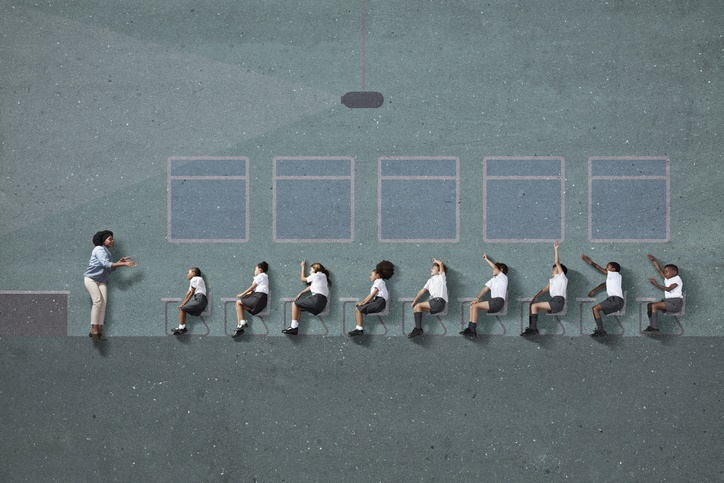
I am no expert, but as we enter and live through these challenging times, I am reminded that despite the many messages declaring we are all in the same boat, the truth rings true in our understanding that we are not all in the same boat.
We are all in the same storm, but our boats look very different.
Some are yachts; others cruise liners, some have to make do with canoes, rubber dingy’s, while still others clench themselves on to floating debris next to others who are struggling to stay afloat under their own strength.
- Lockdown diaries: What I’ve learnt as a parent with my daughter away
- Creative parenting in a crisis: Necessity is the mother of all invention
- Lessons from the autistic community: Supporting children through the coronavirus pandemic
Different realities, opportunities, and levels of privilege
We are certainly not in the same boat, and our abilities to weather this storm are becoming harder and harder to ignore, despite our desperate desire to hold on to rainbow nation sentimentalism.
One post recently shared gave perfect clarity to this image when it highlighted:
“Only in a country with a history such as ours, do we have many families starving while others complain they cannot go jogging in their suburbs.”
We are a great people but very different in our realities, opportunities, and levels of privilege.
Memories of apartheid
I read an article recently that commented on the dangers of our heightened state of security where some communities have armed patrols keeping them from straying off their doorsteps, while others have to make do with running laps around their comparatively large homesteads, in an attempt to maintain their loyalty points.
The author highlighted the trauma responses that this practice may trigger in some, as they remembered similar heavy-handed approaches from their memories of apartheid.
Without being too cynical and while conceding that many people are running wonderfully uniting programs, uplifting and feeding communities and raising awareness, I must suggest that requesting people to sign your petition demanding a more flexible workout radius, when children are starving, and parents are resorting to destruction of property, so that their plight may be considered, is a little on the distasteful side and demands that perspectives be widened.
All this to say, we are in very different times and we will not be able to ignore certain realities as readily as we may have done in the past, while we journey into tomorrow.
Trauma and how this plays out in education
This time has led me to think more about kids, trauma and how this plays out, especially in an educational setting.
Dr Bruce Perry writes the following in The Boy who was Raised as a Dog
“One of the major advances in the clinical arena over the last ten years is the understanding that some forms of developmental experience-for instance food, and housing insecurity, racial or cultural marginalization, and other stresses often associated with poverty-can result in physiological, emotional, social and cognitive symptoms similar to those seen following extreme traumatic events, including physical and sexual abuse or exposure to domestic violence.”
The effects of trauma and the resulting consequences on a child’s ability to learn have now been well documented over the last two decades.
Resilience focused approaches
The stress response system and how it becomes sensitized through repetitive, unpredictable, and prolonged activations has been shown to severely prejudice a child’s ability to learn and succeed in many contemporary educational settings.
This has led to a large increase in the need for trauma-informed and resilience focused approaches to education, parenting and care-giving in general.
Given Dr’ Perry’s comments above, the trauma-exposed and highly stressful reality that many of South Africa’s children experience and now the added and increased trauma they will experience from a post-Corona South Africa, I am wondering how we will not simply navigate the pre-existing educational challenges but navigate, with success, the education of kids who have experienced further trauma and will need more support than previously required and possibly not provided?
Where to from here?
What changes will we need to make to our educational approaches to equip and support these kids in a more effective and trauma-informed way?
And how can we expect to succeed at educating kids whose needs informed their challenging behaviour, but were not met and who will now more than likely have increased needs informed by the increased stresses and trauma experienced from living through a pandemic?
In addition to curriculum support, revision and catch up plans, we need to be thinking how best we can support our kids and their parents in a more trauma-informed way, to perhaps mitigate past hurts as well as current and future trauma’s, which will, as Dr Perry highlights, result in symptoms which ordinarily are only seen after extremely traumatic events.
Incidentally, many of these kids have experienced these too.
Where to from here?
Originally published on Thefatherheart.org and republished with kind permission from Tom Jordi.
Chat back:
Share your story with Parent24. Anonymous contributions are welcome.
WhatsApp: Send messages and voicenotes to 066 010 0325
Email: Share your story with us via email at chatback @ parent24.com




 Publications
Publications
 Partners
Partners











